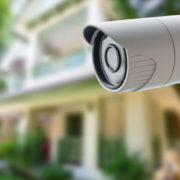20 Tips for Home Safety
When it comes to home safety, it’s important to protect your home against threats like burglary, intrusion and fire. Having a monitored home security system is one of the best ways to start protecting your home against all of these threats, but there are additional safety precautions you can take as well to help keep your home safe.
Below are 20 home safety tips to help bolster your home’s security as well as help protect your home against fire threats. Put these into practice starting today to help protect your home.
The first 10 home safety tips focus on improving your home’s security. Use these tips along with your home security system to help protect your home and your loved ones.
- Create the illusion that someone is at your house.
If you plan to be away for an extended period of time, leave a TV or stereo on in a room near the front door or other entry points like side doors or first-floor windows. Use exterior lighting and motion detectors to minimize places where a burglar could easily hide, as well. - Make sure all exterior doors have reliable locks.
Install 1-inch deadbolt locks on all exterior doors, and lock all doors before leaving your home or going to bed. You can also use optional home security equipment like smart locks to lock and unlock doors remotely using the ADT Pulse® app. - Always look before opening the door.
If you get an unexpected knock at the door, check to see who it is before opening it. You can also keep your home security system’s wireless keychain handy when there’s a stranger at the door, in case you need to call for help in an instant. - Don’t leave spare keys in obvious locations.
Don’t leave extra keys under doormats, potted plants or any other obvious outdoor location. Thieves will generally find them. Find an inconspicuous place to hide the keys, or give a set to a neighbor you can trust. - Secure your sliding glass doors.
Burglar-proof your glass patio doors by setting a pipe or metal bar in the middle bottom track of the door slide. The pipe should be the same length as the track. You can also use optional home security equipment, such as a glass break sensor to alert you if a glass door or window is shattered. - Keep garage doors closed at all times.
Your garage door leads directly into your home, so it’s important to keep it closed, including when you’re at home. Home security system components such as an overhead garage door contact can also provide added protection to your home. - Keep drapes and blinds shut.
Don’t allow intruders to easily see what’s inside your home – especially in rooms where there is expensive equipment. Drapes and blinds obscure a potential intruder’s view, making it difficult to see which rooms hold high value items, or even whether someone is inside the house. - Store cash, jewelry and other valuables in a safe or safety deposit box
Keep your valuables out of reach for an intruder. Use a secured safe or safety deposit box in a bank to stash away your valuables when they’re not in use. In addition, remember to arm your home security system every time you leave your house to ensure your home, pets and valuables are safe. - Don’t leave notes on the door for others when you’re not there.
Leaving notes for service people or family members alerts potential burglars that you may not be home. - Adjust your telephone ring to its lowest volume setting.
If you’re going to be away from home for a few days, an unanswered phone may tip off a burglar that no one is home. Also, have a neighbor or friend collect your newspaper and mail. Never cancel delivery – since you don’t know who will get that information.
Home Fire Safety Tips
To truly protect your home, you’ll need to know how to protect it against other threats like fires that can put your family and your home at risk. The next 10 tips focus on helping keep your home and loved ones safe from home fires.
- Never leave candles or other open flames burning unattended.
There should always be an adult present when candles or any open flame is in use. Do not leave these fire dangers unattended. Also, be sure to teach young children about the dangers of playing with fire including matches and lighters. - Use fire resistant building materials
When buying, building or renovating your home, make sure you use fire resistant materials on your home. Pay special attention to roofing and siding materials which wrap your entire home. There are many affordable options that are fire resistant, so do your homework to choose materials that will truly protect your home. - Douse cigarette and cigar butts with water before throwing away.
Don’t throw cigarette and cigar butts directly into the trash. These can ignite a fire. Instead, make sure these are completely put out with water before tossing them in the trash. - Never leave the stove or other fire dangers unattended.
Don’t leave hot irons, or burning stovetops and outdoor grills unattended while in use. Double-check that you’ve turned them off after use. Having added protection like carbon monoxide detectors or smoke and heat sensors can also help you protect your home and loved ones from fire. - Clear and dispose of dry or dead vegetation.
Be sure to regularly clean up and properly disposed of yard waste and other dry or dead vegetation that may present a fire risk. This is especially important during hot or dry months to help you protect you home and surrounding areas from fire. - Keep fire hazards stored away.
Store firewood and other combustibles away from your home. In addition, keep the lid on your trashcan secured at all times to avoid accidents. Things like paper waste and other types of trash can easily catch fire. - Install smoke alarms on every level of your home.
For the best fire detection and notification protection, install both ionization and photoelectric-type smoke alarms. Put them inside or near every bedroom. Test them monthly to make sure they work and replace the batteries once a year. Safeguarding your home with heat and smoke sensors can give your home an added layer of protection. - Don’t install deadbolts that lock with an inside key.
You need to get out fast if a fire starts. A missing key could trap you inside. If you have small children, there are devices that you can use to keep them from opening doors that won’t put your family at risk in an emergency. Also, don’t nail windows shut. Make sure they open easily. - Make a fire escape plan for your family.
Find two exits out of every room. Pick a meeting place outside. Practice makes perfect – hold a family fire drill at least twice a year. Make sure your entire family is aware of your fire escape plan and knows how to properly operate your home security system. - Make sure your street address is clearly visible.
Be sure your street address is visibly posted so that firefighters can identify your home in the event of an emergency. Display your address on your mailbox and home to help first responders find you quickly.











